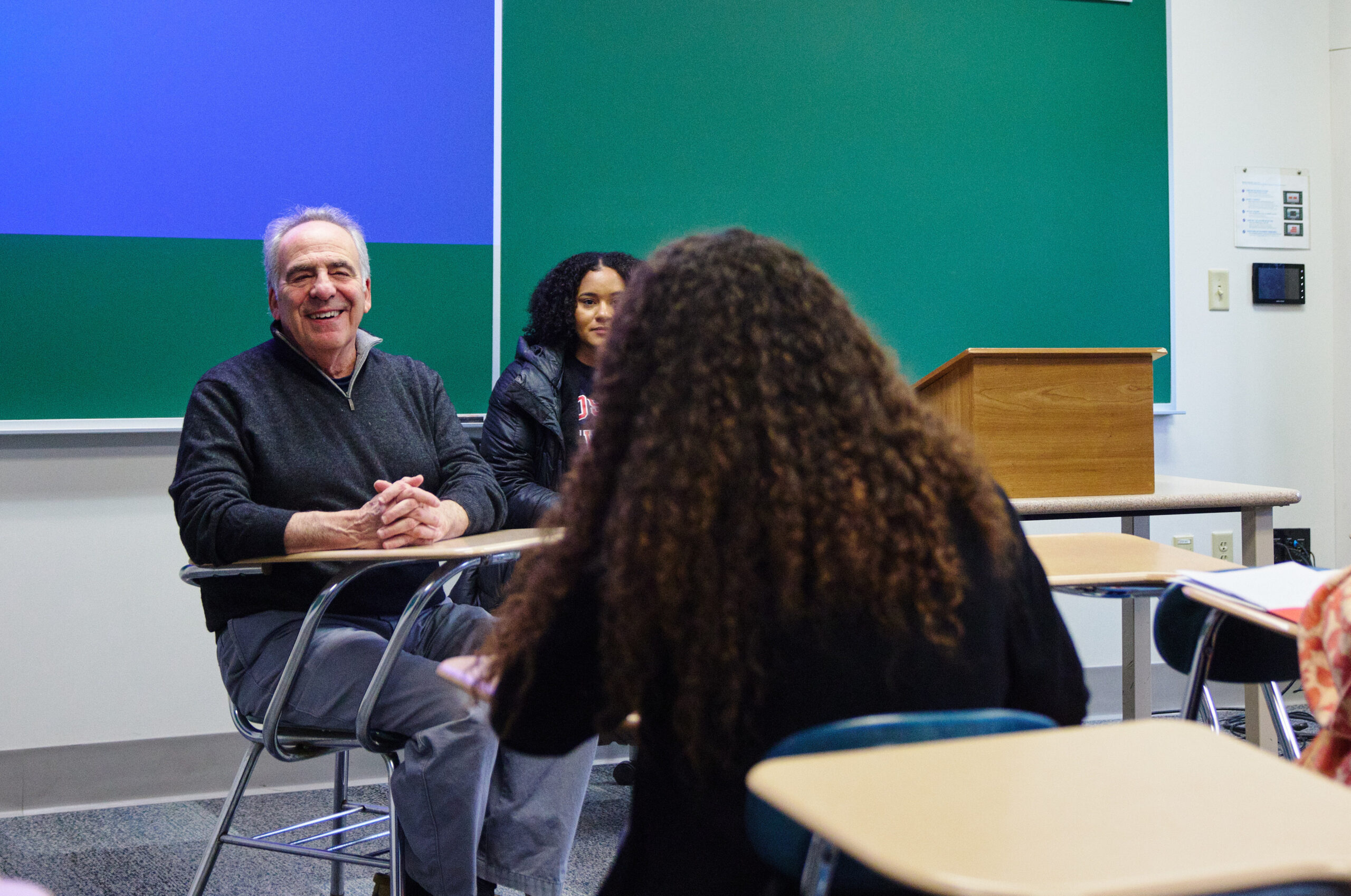How Can An EdD Help School Leaders Meet Today’s Challenges?

EdD Program Director Jeffrey Young with BU Wheelock students. Photo by Christina McDonnell
How Can An EdD Help School Leaders Meet Today’s Challenges?
To be effective, they need knowledge, skills, and courage, says BU Wheelock’s Jeffrey Young
School leaders like superintendents, assistant superintendents, principals, and department chairs need to marshal a wide variety of skills and resources to respond successfully to the complex demands that they face on the job. And to do that, many of them seek specialized education that allows them to capitalize on those skills and resources successfully. A Doctor of Education (EdD) can provide this rigorous training to prepare school leaders to meet real-world challenges head-on.
Jeffrey Young, a master lecturer in Educational Leadership & Policy Studies, recently became the director of BU Wheelock’s Educational Leadership & Policy Studies program, including the EdD program. Young’s goal is to hone the strengths of the program to adapt it to the needs of school leaders and administrators in the field. We spoke to him about his vision for the program, the values he upholds as an educator, and how he trains school leaders to tackle a variety of topics.
Q&A
BU Wheelock: What can principals, superintendents, and other school leaders learn about being more effective in their jobs?
Young: Serving as a principal or a superintendent is really hard work. We can support people in these roles by giving them the knowledge, skills and courage they need to exercise effective leadership in these challenging times. In addition to the foundational knowledge aspiring leaders need around instruction, planning, finance and operations, legal issues, politics, family and community engagement, and so on, we must also help our graduate students develop the habits of mind of a reflective practitioner who can learn from experience.
BU Wheelock: You’re a former superintendent and educational leader. How does that experience inform your understanding of what school administrators need to know?
Young: We want to be sure that we’re not creating solutions in search of a problem. Too often, we tend to brainstorm practices and policies before fully diagnosing the problem we are trying to solve. As a superintendent, I always liked to ask a simple question such as “What is going on here?” Not surprisingly, such a query would yield multiple responses, all of which should be understood before leaping to next steps.
The challenges and opportunities in schools today are highly complex and typically rooted in history; those issues that took years to harden into current reality will not be fully addressed overnight with Band-Aid approaches that look good on paper but fail to deliver in schools and districts. A thoughtful, methodical process of public deliberation is essential for communities to share ownership for creating improved outcomes.
BU Wheelock: School leaders are responsible for a lot of information. What’s one area where you think they could really grow?
Young: We ought to pay more attention to adult learning and leadership. Most of the time, administrators work primarily with adults—principals, teachers, parents, caregivers, members of the community. Often, we are not providing direct educational services to the students, and we should acknowledge that adults learn differently from children. Working with these adults involves understanding where they are in their lives and their careers and supporting them in becoming active participants in defining the future.
BU Wheelock: You recently took over the role of program director. What are some of your priorities?
Young: This year, we are going to focus on our master’s in Educational Leadership & Policy Studies: PreK–12 program. We will collect feedback from our students and faculty as we listen, learn, observe, and make decisions. Our outstanding program faculty are committed to being self-reflective and trying to figure out the best way to prepare our students. For example, we want the EdM program to be recognized as a leader in preparing our graduates to advance the cause of equity and excellence, to ensure that all children in schools have opportunities to realize their dreams and ambitions.
Our students are going back into the field. In general, they are not planning a career as researchers; they’re going into schools and districts. Nonetheless, we want to promote the intersection of theory and practice in the belief that a sound background in the most compelling research will inform effective practice. We aim to support our graduates as they get ready to exercise leadership in complex situations.
BU Wheelock: You mention exercising leadership in complex situations. How do you train future primary and secondary educational leaders to manage challenging situations?
Young: One way is by using a library of case studies to allow students to place themselves in different situations, whether it’s crisis management, the current domestic and global political environment that we face, or daily decision-making.
Perhaps there is no skill more important than listening. I don’t think people listen that much, to be honest. I think we’re all good at expressing ourselves, but we’re less patient and open and porous when it comes to listening and learning. The wisdom of the community is always greater than the brilliant ideas of any single individual.
Comments & Discussion
Boston University moderates comments to facilitate an informed, substantive, civil conversation. Abusive, profane, self-promotional, misleading, incoherent or off-topic comments will be rejected. Moderators are staffed during regular business hours (EST) and can only accept comments written in English. Statistics or facts must include a citation or a link to the citation.